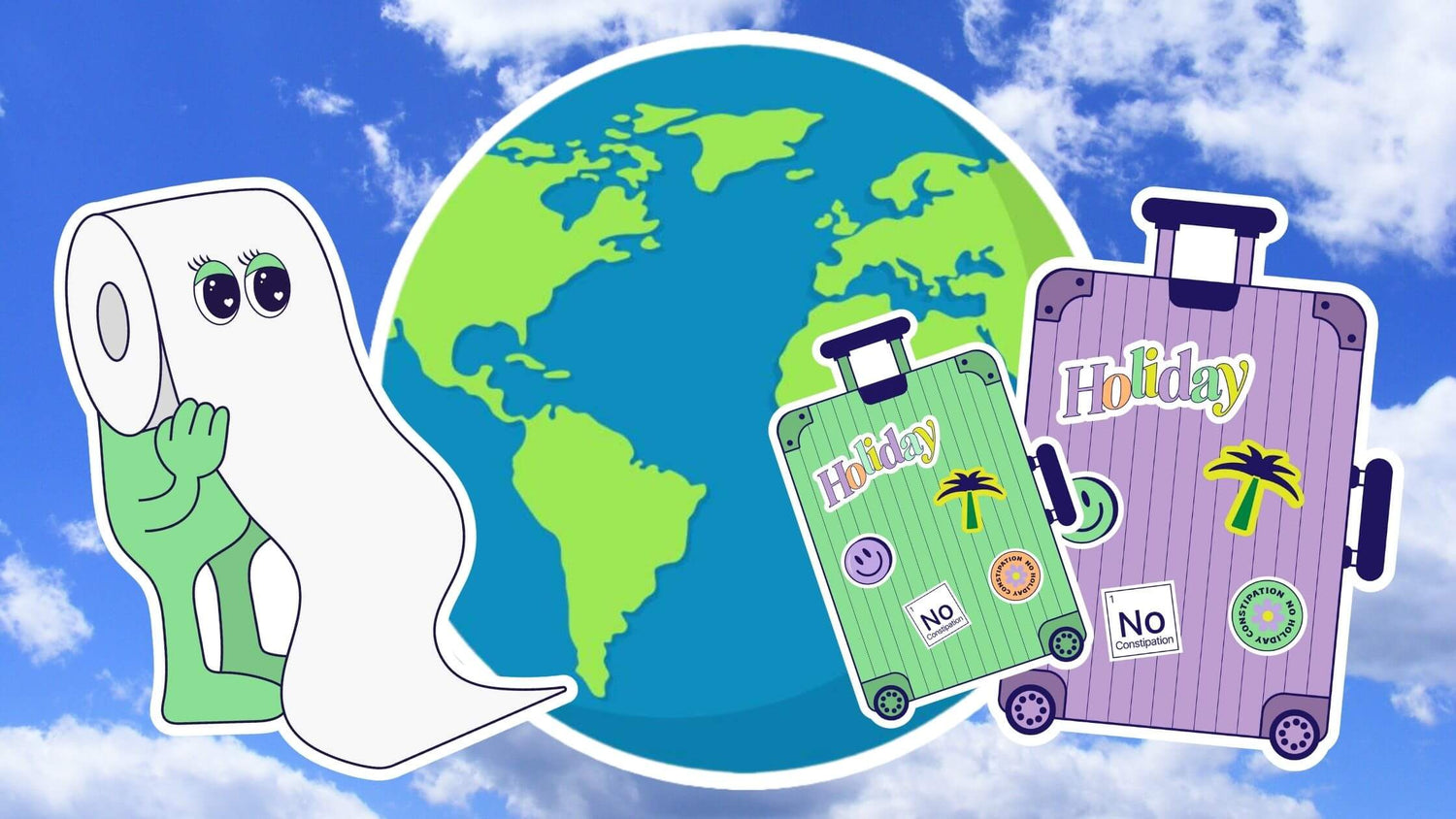If you’re a keen traveller, you might be no stranger to the dreaded travellers’ diarrhoea. This is when you get diarrhoea within ten days of travelling to an area of the world that has poor sanitation and hygiene. Anybody can experience it, even if they make positive lifestyle changes to stop bloating and digestive issues whilst they’re travelling the world.
While exploring new areas of the world is exhilarating and enables you to create long-lasting memories, it’s not so fun when diarrhoea strikes. In this article, we’re going to give some top tips on how to avoid traveller’s diarrhoea with helpful lifestyle changes and natural remedies. First, let’s cover what travellers’ diarrhoea is and what causes it.
What Is Travellers’ Diarrhoea?
Travellers’ diarrhoea refers to the development of chronic loose stools that occur when a person is travelling. More specifically, it is diagnosed when an individual has three bouts of watery stools within 24 hours. It’s especially common in those who travel to countries within Africa, Asia, Central and South America, and The Middle East, as many countries within these continents have poor public hygiene and sanitation.
The symptoms of travellers’ diarrhoea can vary from person to person, but the most common and general symptoms you can expect if you’re dealing with this issue include:
- Bloating and indigestion (which is often mistaken as travel bloat)
- Nausea and vomiting
- Abdominal pain
- Loose stools and increased bowel frequency
- Blood in the stool (haematochezia)
- Urgency when going to the toilet
- Extreme fatigue
- Fever (high temperature and excessive sweating)
What Causes Travellers’ Diarrhoea?
Travellers’ diarrhoea develops within ten days of travelling to another country and can last for several days before resolving on its own. In severe cases, it may require medical intervention with antibacterial, antiviral, or anti-parasitic medications and rehydration solutions.
This relatively common condition that affects up to 60% of travellers is caused by consuming foods or drinks that are contaminated with bacteria, viruses, or parasites. These pathogenic microorganisms can disrupt the balance between good and bad bacteria in your gut microbiome, causing increased fluid loss and poor nutrient absorption.
Around 90% of travellers' diarrhoea cases are caused by bacteria. It's mostly enterotoxigenic Escherichia coli (E. coli) that is to blame for travellers' diarrhoea, but Salmonella, Shigella, Campylobacter, and Vibrio species of bacteria can also cause this issue. Some viruses, such as norovirus, and parasites, mainly Giardia intestinalis, are additional recognised causes of travellers' diarrhoea.
If you’ve eaten street food or have eaten in a stranger’s house or at a lodge, you are putting yourself at risk of travellers’ diarrhoea. If you’re taking medications for your stomach or colon, or if you’ve recently had gastrointestinal surgery, you’re more at risk of developing digestive issues after consuming contaminated foods or drinks.
Transmission of Travellers’ Diarrhoea
Travellers’ diarrhoea is most commonly spread by faecal-oral transmission, meaning when a traveller consumes food or water that is contaminated with faeces that contain either a bacteria, virus, or parasite that impacts the digestive system.
Most travellers will experience symptoms between six and 24 hours after they’ve consumed something that has been contaminated by bacteria or virus, and up to three weeks after being infected by a gastrointestinal parasite.
Depending on the causative agent (the species of bacteria, virus, or parasite that a traveller has consumed), the mode of infection varies. In some cases, the pathogen decreases the ability of the intestinal mucosa (intestinal wall) to absorb nutrients and fluids. In turn, this leads to an increase in gastrointestinal output and diarrhoea. Others cause the intestinal mucosa to become inflamed. and some severe infections can lead to the destruction of the mucosa altogether.
How Can I Avoid Travellers’ Diarrhoea?
Unfortunately, you can’t always avoid travellers’ diarrhoea. Many travellers get sick regardless of taking precautions with their eating and drinking choices.
The main issue is the lack of sanitation in third-world countries, and there’s very little you can do about this as an individual. Reducing the prevalence of travellers’ diarrhoea requires wide-scale changes and improvements in the living conditions and sanitation of many countries across the world.
However, you can take steps to reduce bloating and minimise your risk of travellers’ diarrhoea (and hope that you don’t accidentally consume any contaminated foods or drinks) whilst you’re away from home. You’ll need to practice good personal hygiene and take the necessary precautions around food and water.
Wash your hands regularly using soap and warm water. Make a conscious effort to wash your hands:
- Before eating and drinking
- Before preparing foods (especially raw meat)
- After using the toilet
- After visiting food markets
- After touching live animals
Consider carrying some hand sanitiser around with you to disinfect your hands whilst you’re eating out. Make sure that any hot dishes you eat are piping hot all the way through. Check that any meat in your dishes is properly cooked and has no raw areas.
Any water that you drink should be from an untampered sealed bottle. Alternatively, the water should have been boiled and cooled before consumption to kill any potentially harmful pathogens that might be lurking in the fluid. Avoid using ice cubes in your drinks as you don’t know where the water that has been used to make them has come from.
Over the counter diarrhoea tablets are said to be an effective treatment for travellers’ diarrhoea. They could decrease your risk of getting diarrhoea whilst on holiday, and it’s also an effective treatment for heartburn and indigestion. However, it’s important not to use it in the long term as it can cause constipation if you overuse it and you might end up needing to take additional medications or remedies for constipation relief. It’s recommended not to use it for any longer than three consecutive weeks.
When to See a Doctor if You’ve Got Travellers’ Diarrhoea
If you only have mild travellers’ diarrhoea, it should clear up on its own without any intervention within a few days to a week. Make sure you have plenty of rest and stay hydrated (with bottled or boiled and cooled water) to support your recovery.
If your diarrhoea is disrupting your daily activities and significantly reducing your quality of life, or you’ve experienced six or more episodes of loose stools within a 24-hour period, you should seek help from a reputable doctor in your local area.
Depending on where you’re travelling to and the rules in the country, you might need health insurance to access your local hospital or primary care services. Make sure to do plenty of research before you go travelling to ensure you set up the necessary health and travel insurance policies to cover you if you fall ill with travellers’ diarrhoea or something more serious whilst you’re away.
Similarly, if you notice a lot of fresh red blood or thick mucus in your diarrhoea, you can’t stop vomiting, or you’re getting very severe abdominal cramps, seek medical attention immediately.
Your doctor might prescribe anti-diarrhoeal medications, such as loperamide or Imodium, to reduce your bowel frequency and support your recovery. You might require intravenous (IV) fluids to replenish lost fluids and rehydrate your body if you’ve had excessive diarrhoea and vomiting. This is something that your doctor will advise you about and administer if you’re happy having a cannula placed into your arm or hand to deliver the fluids.
Your doctor will perform a variety of tests to determine the cause of your digestive issues so they can provide the correct treatment for it. If the doctor suspects that your travellers’ diarrhoea is the result of a bacterial infection, they may prescribe antibiotics. For a suspected viral cause, you’ll need antivirals and parasitic medications if it’s a parasite causing your issue.
Using A Dose For Bloating For Digestive Relief
If you’re prone to bloating and are often on the hunt for ways to reduce bloating quickly, even when you’re in the comfort of your own home, we’ve got the perfect remedy for you at Wild Dose.
We have formulated an effective supplement to relieve bloating and provide gas relief when you’re dealing with digestive issues. Our supplement, A Dose For Bloating, contains two billion probiotic bacteria, seven digestive enzymes, and seven plant extracts.
Probiotic bacteria are known to be extremely beneficial for gut health. They support metabolism, produce beneficial compounds (such as vitamins and short-chain fatty acids), and improve the strength and resilience of your intestinal wall.
Digestive enzymes are produced naturally in the body, and they aid digestive processes by helping to break down ingested foods into smaller pieces that can be more easily absorbed. Although your body produces these enzymes naturally, you can improve your digestion by supplementing with exogenous digestive enzymes.








